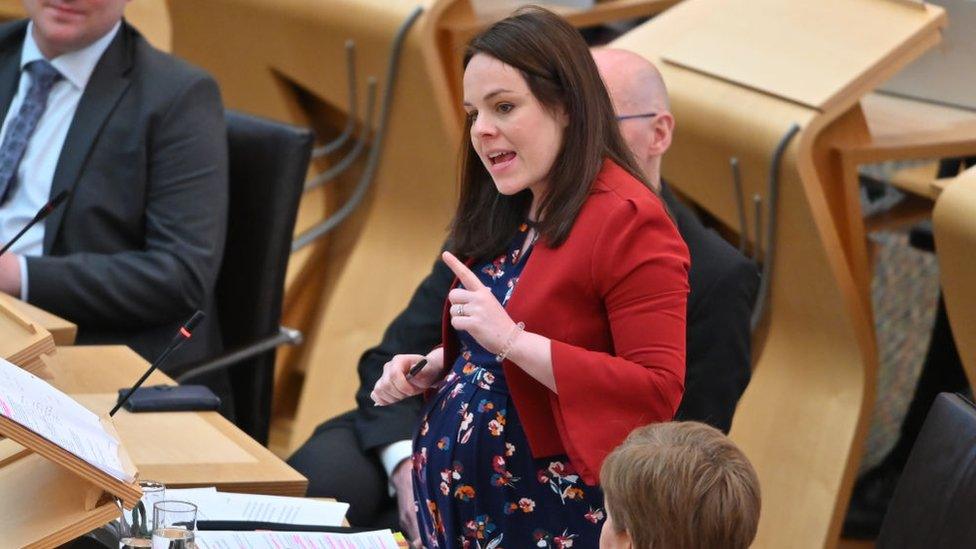Think tank calls to raise and reform taxes in Scotland
- Published

Tax in Scotland needs to be both raised and fundamentally reformed, according to a think tank report.
Reform Scotland said the needs of an ageing population, at a faster rate in Scotland than elsewhere, mean that it will not be enough to tweak tax rates.
It argues tax reform is overdue, as the falling number of taxpayers meets the growing cost of more older people.
Governments, it said, should be looking to shift the tax burden from income towards wealth.
It also said the sources of tax need to be broadened.
The paper, external also considered the upfront investment needed to mitigate climate change. However, it did not consider the implications of Scottish independence.
The Taxing Times report, written by Heather McCauley, a former government official in Scotland and New Zealand, said the tax system will need to be completely redesigned, rather than simply tinkering with the rates of current taxes.
She said: "Scotland will face increasing pressure on its public finances in the coming years, both as a result of global issues such as climate change and the pandemic recovery, but also because of local issues such as Scotland's demographic challenge.
"Inevitably, higher tax revenue will be required to deal with this. In order to create the right environment for optimal tax raising, debate in Scotland needs to focus as much on the way money is raised as it does on the way money is spent.
"Having studied tax systems in similarly-sized countries across the world, from New Zealand to Scandinavia, it is clear to me that the current structure of Scotland's tax system is not fit for the future."
She said Scotland needed to start again, and to create a new and fairer tax system, focused more on immobile tax bases such as wealth and less on mobile ones such as employment income.
A new system would need to be used to drive sensible and sustainable increases in overall tax revenue, she added.
The paper highlighted that National Records of Scotland (NRS) projections are for Scotland's population to begin falling in 2028 and reduce by 1.5% by 2045 while the UK population will grow by 5.8%.
The report said that in considering how to use its existing tax powers, raise new taxes or argue for further tax devolution, Scotland needs to consider the tax system as a whole and be clear about its direction of travel.
Climate change means that fossil fuel and other environmentally-damaging subsidies embedded in existing tax design need to be removed "as a matter of urgency" and all taxes, whether environmentally-focused or not, assessed for their environmental impacts, according to the report.

Kate Forbes said the Scottish government had used its powers to create a fairer tax system
Reform Scotland is a think tank which looks at public sector reform and encouraging private sector growth, and is chaired by former Labour first minister Lord McConnell.
Its director Chris Deerin said: "Most people would prefer to pay less [tax], but we live in times where the demands on the public purse are growing.
"Scotland's overall population is ageing while our working-age population is shrinking. We must find new revenue just to meet existing commitments, even as new commitments come on line too - such as funding a national care system.
"Meanwhile, the Covid epidemic has raised national debt levels and governments are also trying to help households through the cost of living crisis, with its consequences for heating bills, the weekly shop and mortgages.
"It's very difficult to see how Scotland can meet its future commitments - whatever its constitutional status - without looking afresh at the tax system, at who and what we tax, and at what the right balance should be."
'More progressive taxes'
Finance Secretary Kate Forbes said the current devolution settlement limited the extent to which the Scottish government could deliver significant reform of the tax system.
She said: "The vast majority of tax powers remain reserved to the UK government, as do many key economic policy levers like migration. Independence would put the power to decide Scotland's tax system in Scotland's hands."
The finance secretary said that the Scottish government had used the powers it had to create a "fairer and more progressive tax system".
Holyrood has gained significant tax powers in recent years, notably over income and property sales.
The Scottish government has altered the rates and thresholds slightly, but not taken up the option of more fundamental reform, or tapped new revenue sources, or tackled problems with council tax and business rates.


Since 1999, the Scottish Parliament could reform council tax and business rates as much as it wanted. It can now make major changes to tax on income and property sales.
But it hasn't. Most political debate has been how to spend money: less on how to raise it. The changes introduced at Holyrood have been largely to make a point about being slightly more progressive than Westminster.
This report says that has to change. Whatever else happens in Scottish politics, and beyond, there are spending pressures building up that will require the raising of more tax. That will require smarter and broader tax, putting less emphasis on taking a slice off employment and more on harvesting revenue from wealth, including property and financial assets.
Some tax bases fall away. We have long since ended the tax on windows. Digital commerce has forced changes to the way we tax gambling, and undermined the way we tax shops. Before long, petrol and diesel for cars will no longer be raising significant sums for the Treasury.
So assuming, as this report does, that Scotland continues to want the state to provide services for all - such as health, schooling, student tuition and care for the elderly - there is a need to find a way that pays for that.
It's only in the second last paragraph that the report's author, Heather McCauley, raises the question of Scottish independence and where tax powers should lie. Devolution throws up anomalies. There are many challenges to the way Westminster raises tax from VAT and National Insurance. There are lessons to learn from countries that have addressed similar questions: from New Zealand to Norway.
But the same questions persist, whatever the constitutional arrangements. This is a challenge to look beyond the constitution, and beyond the current cost-of-living crisis, and to decide what and who to tax in a way that is fair, efficient, that works as a system across taxes and benefits, that carries public understanding and support, and is better suited to future needs.
- Published9 December 2021

- Published1 June 2022